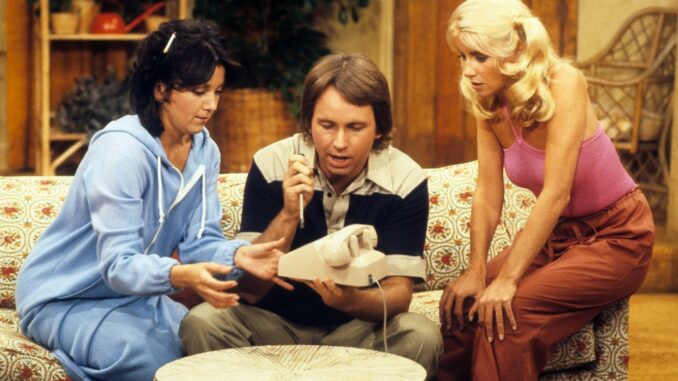
The owner of the John Ritter sitcom tells a judge that “3C” is a “poor adaptation” of “one of the first television shows to say that there was nothing wrong with being gay”
As a federal judge in New York is set to decide whether playwright David Adjmi‘s 3C violates the copyright authority of DLT Entertainment, owner of the late ’70s sitcom Three’s Company, the legal defense fund of the Dramatists Guild of America has submitted an amicus brief that argues that “a ruling that 3C is not a fair use would have negative reverberations throughout the theater industry.”
The play, which ran for two months last year off-Broadway, doesn’t feature “Jack Tripper,” but rather “Brad,” a guy who says he’s gay so a Santa Monica, California landlord will let him live with two women. Unlike the television version, which featured John Ritter in the lead, Brad actually is gay and the work takes a darker look at the set-up. In suing for declaratory relief that 3C is not a copyright infringement, Adjmi said his work comments on the “ways the television show presented and reinforced stereotypes about gender, age and sexual orientation.”
The line between what’s fair, free speech and what’s an impermissible violation of someone else’s rights is a topic that hits the courts again and again. A quarter century ago, the rap group 2 Live Crew came out with a parody of Roy Orbison‘s “Oh, Pretty Woman,” and in 1994, the U.S. Supreme Court overturned a lower appellate court by deciding the rap song was in-bounds (at least in terms of purpose and character). On Monday, the high court examines in a non-copyright context whether a threatening rap song posted on Facebook is tolerated by the First Amendment, but two decades ago, it was Luther Campbell‘s come-ons that attracted legal heat. And it was Justice David Souter who wrote, “whether… parody is in good taste or bad does not and should not matter to fair use. As Justice [Oliver Wendell] Holmes explained, ‘[i]t would be a dangerous undertaking for persons trained only to the law to constitute themselves final judges of the worth of [a work], outside of the narrowest and most obvious limits.’”
In looking at 3C, the Dramatists hope for similar generosity.
“Anyone reading the script of 3C can tell that 3C is a parody,” states the amicus brief. “Assertions to the contrary ignore the very definition of ‘parody’ well established by the Supreme Court in Campbell… Counter-Claimants’ position that all that 3C adds to Three’s Company is shock and vulgarity is clearly contradicted by the play itself.”
As for the other view, in a memorandum opposing Adjmi’s motion for judgment on the pleadings (read here), DLT argues that the play is a “poor adaptation” of the television series that nevertheless has “stolen not only the heart of the work, but every theme, detail, and character, thereby infringing Three’s Company’s exclusive right to prepare derivative works.”
The owner of the TV sitcom, represented by attorneys at Kenyon & Kenyon, breaks down 3C by telling the judge it depicts “the same type of sexual tensions and challenging the same orthodoxy that Three’s Company challenged.”
Adjmi believes he’s using the show for the purposes of a fair, albeit darker, commentary, but DLT still thinks it can trace each of the play’s elements to the sitcom. For example, the play features characters using drugs. “Three’s Company did depict drug use, devoting an entire episode to the mishaps that occur when Chrissy and Jack discover marijuana plants growing in their landlord’s backyard,” responds the defendant.
As for the play’s big twist — that the main character actually is gay — that doesn’t make it transformative, argues DLT.
“In fact, Three’s Company did not promote homophobia, it lampooned it,” says defendant’s opposition brief. “The only character who voiced disapproval over Jack’s pretended sexual orientation was the out-of-touch landlord Mr. Roper. Three’s Company was one of the first television shows to say that there was nothing wrong with being gay.”
If the judge sees Brad as a parody of Jack, Connie a parody of Chrissy, and Linda a parody of Janet, the defendants espouse an alternative argument that Adjmi’s play took too much from both a “qualitative and quantitative standpoint” and that 3C would ruin its market for licensed stage adaptations. “Authorized Three’s Company productions would seem hackneyed or a ‘rerun’ to an audience that had already seen the very same characters, set, and plot in 3C,” says DLT.
That has the Dramatists interjecting.
“Dramatists often draw on a broad variety of source material for inspiration for their works,” says the amicus brief authored by David Faux. “Some have drawn on material in the public domain, like Phantom of the Opera and Les Miserables, which are both running on Broadway at present. But this practice is not a recent phenomenon. Shakespeare’s King Lear was based on a well-known folk tale, and there was another play at the time based on the same story (The True Chronicle History of King Leir).”
The Dramatists note that some works “rightly require the permission of the owners of the original works” — they cite currently-running shows An American in Paris, Honeymoon in Vegas, Doctor Zhivago, Finding Neverland, among others — but look to protect works that they believe aren’t adaptations even if they are inspired by works that came before.
“One recent example is Clybourne Park, a drama that won the Tony Award and Pulitzer Prize in 2012,” states the amicus brief. “The author incorporated a character from the classic drama, A Raisin in the Sun, as well as some historical events of the period. Another example is 3C. Parodies may draw heavily on characters and situations in the works they parody because audiences need to recognize the resemblance to appreciate the dramatists’ points.”
